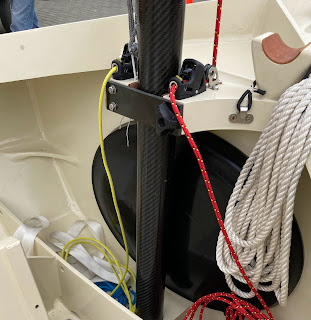The Genesis
A friend came to visit and we drove over to Port Townsend for the Pocket Yacht Palooza. I felt right at home among these maritime tinkerers and craftsman whose motto seems to be “small is beautiful, simple is elegant”. I was particularly interested in how the various boats were configured to step a free-standing mast, and I got some great ideas; it gave me the confidence that an 18 foot hinged, keel-stepped mast can be supported adequately without shrouds or stays when raised & lowered; and that two running backstays will provide sufficient support to fly a square sail downwind.
Later that evening, as I was mulling over ways to configure an old beat up sailboat to fly a square sail and mount both an outboard combustion engine and an outboard electric motor, a name for the boat came to me: Zephelios. Naming a boat before you’ve actually bought the boat, or are even sure which boat you’ll buy, is another unusual way to approach things in the maritime world, but there’s freedom to be found in being a heretic!
The name came to me because my current library rental at the time was a book about Greek mythology; I’d just read about Zephyrus (god of wind) and the next chapter was titled “Helios” (god of both sun and fire). Since this pocket trawler will be powered by wind (in the sails), sun (shining on PV cells to make electricity) and fire (the quick series of fired explosions inside a cylinder), it seemed appropriate to combine Zephyrus and Helios and get Zephelios. Boats are typically referred to as feminine, so if I wanted to be a traditionalist, I would replace the ‘o’ with an ‘a’ (Zephelias) but this vessel will be boxy & utilitarian, and not at all sleek & elegant, so to be true to both myself and the boat, it will likely have a masculine gender identity.
Another possibility is Poustinia, which has a nice feminine ring to it. It’s a Russian word that describes a dwelling, much like a hermitage, only a bit less spartan.

